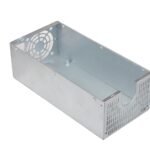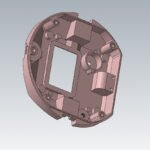CNC machining has been lauded as the biggest advancement in manufacturing over the past half-century. Modern manufacturing utilizes various fabrication techniques and almost every one of them involves the use of CNC machining. So, How did CNC machining become a core pillar of modern manufacturing?
Here is a detailed analysis of the impact CNC machining has had on the manufacturing sector.
CNC Machining vs Traditional Manufacturing
Before we talk about modern manufacturing we need to define its predecessor, traditional manufacturing. Nowadays electronics and computers have become synonymous with manufacturing. But before the advancements in microprocessors, all manufacturing was done manually by hand.
Traditional Manufacturing
Instead of fancy automated machinery, people relied on hand-carved molds and simple tools. Making a simple metal knife was more of an artistic endeavor. Workers would use their eyes to match the size of the blade and hammer it into the correct shape. Though all this work is impressive and a true testament to the skill of the worker, it is also very slow.
Since everything took hours, if not days to manufacture. The manufacturing sector could not keep up with the growing population and its demands. All this resulted in increased prices for everyday products like pots and pans. Even with the invention of milling and lathe machines, this bottleneck in the industrial sector could not be resolved.
CNC Machining
The first CNC machine was invented in the early 1950s and it only took a few years for it to become prevalent in the manufacturing sector. The first CNC machine was called a motor-controlled apparatus. But with the advancements in computer technology, the term Computer Numerical Controlled (CNC) quickly took over.
Advancements in manufacturing techniques over the past few decades have made CNC machines more efficient, safer, and cheaper. It was only a matter of time before CNC machining took its place as a core pillar of our modern manufacturing.
Impact of CNC Machining on Modern Manufacturing
It’s not difficult to see the impact CNC machining has had on modern manufacturing. Everything from increased precision to the reduction in machine times has been made possible by CNC technology.
Here are our picks for manufacturing elements that have benefited the most from CNC machining.
Better Accuracy & Precision

By far the biggest impact of CNC machining can be seen in the accuracy and precision of parts. Machining accuracy is the ability to produce parts as close to the desired dimensions as possible. In contrast, machining precision refers to the ability to maintain the same accuracy across multiple parts.
A machine that lacks precision will produce parts within derided tolerances, but all parts will have slightly different dimensions. However, if a machine is precise but not accurate it will produce parts with the same dimensions but all parts will have the wrong dimensions.
Accuracy and precision mistakes were quite common in manual machining. Limiting the use of parts to low-performance applications. As CNC machines are all controlled by a computer system, the machine can accurately and precisely cut the workpiece within 2000th of an inch (0.0005”).
Higher accuracy and precision meant that manufacturers could produce smaller and more robust parts. Without the capabilities of CNC machining, manufacturers could never produce modern electronics like smartphones.
Rapid Prototyping Capabilities

Prototyping is an important step in the development cycle of a product. A simple product will typically go through dozens of iterations before hitting the market. Longer fabrication times lead to a longer development cycle which slows down innovation and growth.
CNC technology has reduced machining times from days to just hours. Now you can manufacture several different prototypes in a single day. This type of quick prototyping service is called rapid prototyping.
Rapid prototyping has allowed engineers to focus on designing parts, rather than worrying about lead times. Slow prototyping was a major hindrance to engineers, as there was never enough factory space to accommodate all the designs. Manufacturers would allot production capacity to tried and true products, instead of newer designs.
Greater Material Compatibility

Traditional manufacturing lacked diversity and was limited to metal working. However, modern manufacturing has opened the doors to a whole new set of materials. Metals, plastics, composites, hardwoods, and everything in between are now compatible with CNC machining.
Modern woodworking has maintained its traditional roots but has become more efficient and versatile through CNC lathes.
Meanwhile, metal machining has taken a whole new life with CNC. Harder and tougher alloys that previously were considered non-machineable are now commonplace in most factories.
The capabilities of CNC machining incentivized researchers to develop even tough materials, like titanium alloys. Materials that have allowed mankind to send rockets into space.
Lower Operating Costs
Managing and running a factory is tough work. Traditionally you would have needed to hire hundreds of employees working in three shifts to stay profitable. More employees meant higher investment, in tools, wages, and factory space.
A single CNC machine can do the work of a hundred manual machines, in less time and with only one operator. The lower operating costs have allowed small businesses to stay competitive with large corporations, without compromising on quality.
CNC machining has decreased the barrier of entry to the manufacturing space. You can buy a single CNC mill and start your own local machining business with the smallest amount of investment.
On the other side of the coin, lower operating costs have also allowed large factories to increase their production by a hundred folds. Modern manufacturing now produces more products per day, all while keeping material waste to a minimum.
Improved Workplace Safety

The impact of CNC machines isn’t limited to the production line. One of the most significant benefits of CNC is superior workplace safety. CNC machines are designed to minimize the interaction between operators and the cutting tool. Once the material is fixed to the machine, the operator inputs the necessary commands from a distance and monitors the cutting operations.
Safety is a core component of any industrial work. And the lives saved by the introduction of CNC machines are immeasurable.
In our appreciation for CNC machines, we often tend to forget to mention worker safety. Modern manufacturing would not exist if it weren’t for the safety features of CNC machines.
Scalable Machining Operations
CNC machines are extremely versatile tools that are only limited by one’s imagination. Another major improvement in the manufacturing sector is scalability. In short, scalability is the ability of an operation to meet the demands of low-volume production and scale up to large-volume production.
CNC machines are some of the few manufacturing tools that are equally viable for small businesses and large factories. A standard 3-axis CNC mill is commonly used by small business owners, for producing custom parts. But the same machine is used by larger factories to produce simple design parts in bulk.
You will often see start-ups use modern manufacturing to prototype, refine, and mass produce their designs. It also shouldn’t come as a surprise that all of this can be accomplished using a simple CNC machine.
CNC Machining Applications in Modern Manufacturing
The best way to visualize the impact and importance of CNC machining is by looking at real-life examples. To illustrate this impact, we have listed below, the most popular applications of CNC machining in modern manufacturing.

Electronics
Without a doubt, the biggest advancements in the past few decades have come from the tech sector. CNC machining has been a crucial element of modern smartphone and laptop manufacturing.
Woodworking
Woodworking has seen little in terms of innovation from the use of CNC. But it has significantly benefited from the efficiency provided by CNC machining. Complex designs and shapes that previously took weeks to hand-craft, can now be CNC machined in a matter of hours.
Beds, chairs, wall art, etc. are all currently being made using CNC machining.
Musical Instruments
Musical instruments like guitars, cellos, and pianos still require a lot of manual oversight. But CNC machining has allowed craftsmen to focus more on assembly and tuning, leaving the machining to CNC operators.
Automotives
Modern car manufacturers are able to produce up to 1200 cars in a single day. Meaning each car chassis would need to be machined and processed within a few hours. Car manufacturers like General Motors utilize several hundred automated CNC machines to achieve this ridiculous number.
Medical Equipment
The medical industry relies on CNC machining to produce everything, from precision instruments like dialysis machines to small equipment like endoscopes. Almost every modern medical equipment is either partially or fully manufactured using CNC technology.
Aerospace Components
We literally cannot list every single advancement made in the aerospace industry made possible by CNC machining. One of the biggest impacts can be seen in the manufacturing of rocket shells. Large CNC machines, the size of a house, were used to machine out enormous billets of aluminum to produce panels for space rockets.
Choose QBH Technology for CNC Machining Services
QBH is a state-of-the-art manufacturing company, operating out of China. We take pride in our expert and professional team of engineers, who are dedicated to producing the highest quality products. Our sheet metal and CNC machining services are second to none.
QBH offers flexible MOQs, fast production, and quick delivery for both stock and OEM parts. To get a customized quote, Contact us Now!




